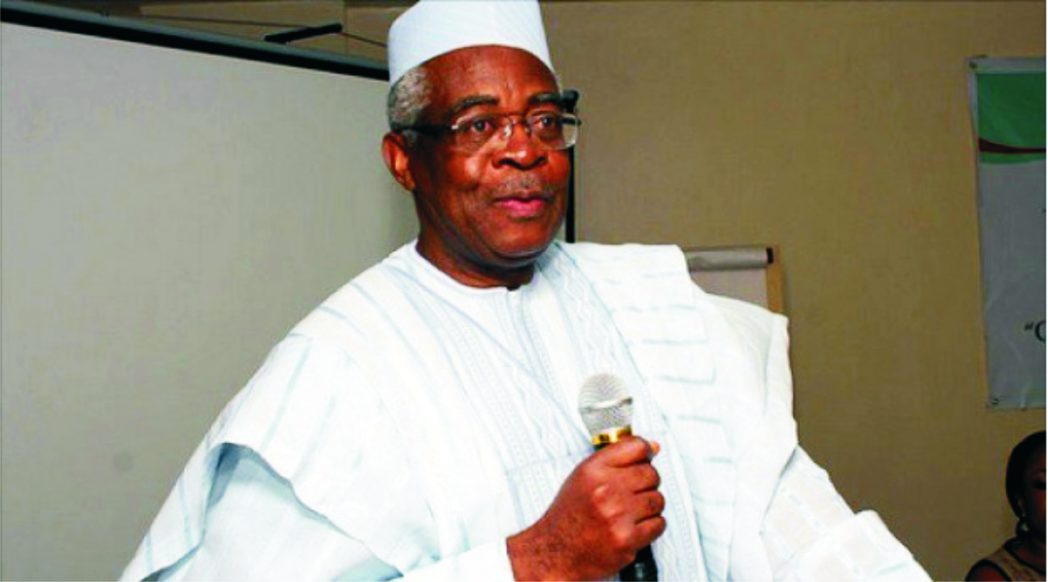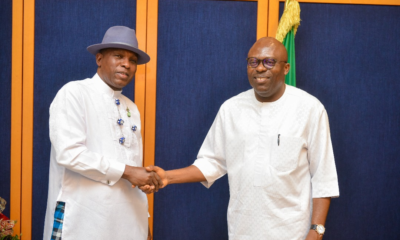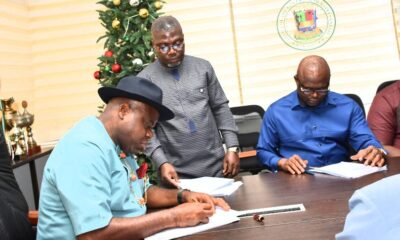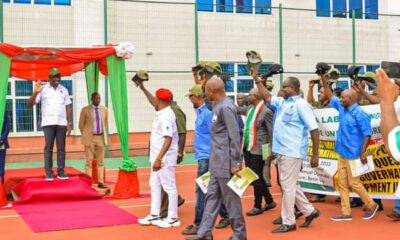Opinion
That Call By Danjuma

Had the story originated from a different source, it would have been difficult to believe it. Had it been seen only on the social media; it would have been easy to discard it and regard it as one of the fake news circulating on the social media every day.
But coming from a respected retired army general, an elder statesman of high repute and having been carried by notable dailies, including The Tide, it must be a credible story that should be analyzed and acted upon.
The truth is that this is not the first time Rtd General Theophilus Dajuma is raising alarm over the unabating killings and general insecurity in the country, especially in the North. In 2018, he had called on people of Taraba and other Nigerians to rise and defend themselves against ethnic cleansing.
“You must rise to protect yourselves from these people, if you depend on the Arm Forces to protect you, you will all die. “This ethnic creasing must stop in Taraba, and it must stop in Nigeria. These killers have been protected by the military, they cover them and you must be watchful to guide and protect yourselves because you have no any other place to go.
“The ethnic cleansing must stop now otherwise Somalia will be a child play.
“I ask all of you to be on your alert and defend your country, defend your state”, he said.
Typical of the current government at the center, the warning was dismissed as false alarm and Danjuma called all manner of derogatory names. Two years later, the former defence minister is sounding the warning again. He alleged that the Army was working with President Muhammadu Buhari to grab lands from its original owners in the North, South, East and West and give same to Fulanis from West Africa and beyond and that if citizens do not rise up now to defend themselves and fight for their ancestral homes, they would regret it in future.
In his words, “The Nigerian Army under Buratai is working with President Buhari to grab lands from indigenous Nigerian owners and give it to Fulanis from West Africa and turn indigenous Nigerian people and land to modern-day Fulani colony”. He said using Boko Haram, herdsmen and the military, a jihad war is being waged against citizens of other ethnic nationalities by the federal government, repeating the call that citizens should rise up and fight for their lives and land before it is too late.
These are indeed weighty, scary, strong worded statements which must not be treated with levity. An Igbo adage has it that if a child is crying and pointing at a particular direction, if his mother is not there, his father will be there. A man of Danjuma’s standing cannot be saying all these from the blues. He must be privy to some confidential information about what is going on in the country which ordinary citizens do not know. Recall that former President Olusegun Obasanjo made a similar insinuation when he alleged that Boko Haram was an instrument of “Fulanization” and “Islamization” agenda of the current administration.
As usual, the Presidency, the military and those in government will tell Nigerians to disregard the warning. But much as we would want to listen to the federal government and believe that it has the best interest of the entire citizens at heart, realities on the ground tend to strongly support Danjuma’s claims. The daily killings across the country, the chasing away of people from their ancestral homes, allegedly with the help of military personnel sometimes, and taking over of these lands by Fulanis are pointers that something is indeed cooking. Major cities in the country are today filled with young people from the North East, North Central, Southern Kaduna and other places who lost their homes as a result of Boko Haram activities, farmers/herdsmen clashes in their various communities. Many of these people who were involved in different farming activities have turned to house helps, keke and okada riders in order to eke out a living. Many others with similar stories are taking refuge in Internally Displaced Persons (IDPs) camps across the country with slim hope of returning home.
It is, therefore, expected of government to sincerely analyze the rtd General’s statement and act positively on it in the interest of the country. If I may borrow a portion of Matthew Hasan Kukah, Catholic Bishop of Sokoto Diocese’s homily at the burial of Michael Nnadi, the 18 years old seminarian whose life was cut short by Boko Haram terrorists, “Nigeria needs to pause for a moment and think. No one more than the President of Nigeria, Major General Muhammadu Buhari was voted for in 2015 on the grounds of his own promises to rout Boko Haram and place the country on an even keel. In an address at the prestigious Policy Think Tank, Chatham House in London, just before the elections, Major General Buhari told his audience: “I as a retired General and a former Head of State have always known about our soldiers. They are capable and they are well trained, patriotic, brave and always ready to do their duty. If am elected President, the world will have no reason to worry about Nigeria. Nigeria will return to its stabilizing role in West Africa. We will pay sufficient attention to the welfare of our soldiers in and out of service. We will develop adequate and modern arms and ammunition. We will improve intelligence gathering and border patrols to choke Boko Haram’s financial and equipment channels. We will be tough on terrorism and tough on its root causes by initiating a comprehensive economic development and promoting infrastructural development…we will always act on time and not allow problems to irresponsibly fester. And I, Muhammadu Buhari, will always lead from the front.”
Many analysts have said that Nigeria is at a collapsing point; it is like a ship sinking deeper into the sea every day and it can only be saved by true governance at all levels of government, justice, equity and fair play, saying no to corruption, oppression, suppression, nepotism and favoritism and treating all citizens equally, irrespective of their religion, tribe or political affiliations. If we continue to rob Peter to pay Paul, or consider some ethnic group, religion or trade union more important that others, we may not have a peaceful, united, developed country of our dream.
Calista Ezeaku
Opinion
Other Sides In Junior Pope’s Death

The tragic boat mishap of Wednesday, April 10, 2024, which claimed the lives of popular Nollywood actor, Mr John Paul Obumneme Odonwodo, popularly known as Junior Pope, and four others, has sent shock-waves across the Nigerian movie industry, and set the social media buzzing with reactions.
A contingent of 12 movie crew members had set out for a boat journey from the River Niger Cable point, a waterside jetty at Asaba in Delta State, to cross to the other side of River Niger, into Anam, a riverine community in Anambra State, for the shooting of a movie set titled ‘Another side of Life’ produced by Adanma Luke. Unfortunately, a series of avoidable events culminated the journey into an ill-fated expedition that sent fives lives to ‘the other side of life.’ The incident made the movie’s eventual ban a nullity, having played-out its symbolic meanings in real life while in the making, rather than on envisaged screens.
An avoidable incident, it exposed our society’s casual attitudes towards marine and general safety, as well as our endemic superstitions, while telling, on several flaps, other side tales of reality in the accounts of what transpired during the production, or rather, play of Adanma’s ‘Another side of Life.’
While veteran actor and Senior Adviser on Military Relations to the President of Actors’ Guild of Nigeria, Mr Steve Eboh, claimed he missed joining the ill-fated boat because he arrived too early before the crew, and had to go back, the producer, Adanma Luke, claimed she missed it because she came too late.
A journey’s jolly take-off from Asaba, Delta state, which ended tragically in its return from the other side in Anambra State, proved to be a rascally journey that showed the other side of rascality, even as T. C. Okoye claimed that pre-performing of obeisance to some marine spirits saved his life. But it was T. C. Okoye who had to hang unto a boat’s anchor in the face of death, rather than rely on the powers of the spirits he had appeased with Fanta, to await rescue from mortal men – sensible men, whose advise that one needs wear life jack during marine journeys – he had forsook, yet gave glory to his rituals after rescue.
Conversely, one may flip the flap to consider the other side of T. C. Okoye’s rituals to ruminate on other possibilities. Could the ringing of bells, spraying of money and snacks, and pouring of Fanta, have evoked the anger of the ‘marine spirits’ as rumoured, or distracted the boat driver, to the point of accident? And as reported by The Punch, what’s the significance of T. C. Okoye ‘dashing’ ritual money to innocent children whom circumstance made to be by the riverside?
Also, the argument by Mr Steve Eboh, that “If the star actors in that boat had wanted to wear life jackets, they would have been given the jackets” holds no ground, because the guild, as well as all the marine transport stakeholders, should have enforced strict safety compliance by all voyagers. It is therefore commendable that the Anambra State Commissioner of Police, Aderemi Adeoye, has ordered exhaustive investigations into the matter to determine criminal liability of all persons involved.
However, in the melee of pandemonium that accompanied rescue efforts, Nollywood celebrities, our society’s supposed role models, prioritized superstitious rescusitation over sure medical practice, rushing victims between spiritualists and hospitals, until a ‘pope’ whose work and journey had bound with the superstitious, died amidst superstition. Indeed, it’s during crises, when people care less about ‘packaging,’ that truth and the real personality of humans stand bare and naked.
While medical personnel who got their chance late had certified Jnr Pope dead, our star-persons held unto their spiritual advisers who claimed his spirit coming back to life, up until reality finally dawned that pope’s spirit has permanently crossed to the other side of life.
Regrettably, the reality has not fully dawned, otherwise three corpses shouldn’t have been buried by the riverside as dictated by spiritualists, and Jnr Pope’s family shouldn’t be worried about what would happen, as rumoured threatened of his three children, if his corpse is not buried by the riverside. However, it appears that having encountered the influence of a frontline celebrity, the spirits have turned capricious by bending divinely demands to accepting two cows, as rumoured, in exchange for Jnr Pope’s corpse being buried elsewhere.
According to the Anambra State Police Public Relations Officer, SP Tochukwu Ikenga, a team of rescuers comprising men of the Anambra State Marine Police Command, the National Inland Waterways Authority (NIWA) and the Maritime Workers Union of Nigeria, with the aid of fisher men, rescued seven persons alive to the Anambra side, while two retrieved corpses were sent across the other side, to the Delta State Marine Police Command jetty where Nollywood officials stood waiting. Of other three victims, two corpses were rescued next day, while a third was thrown out by river tides, all of whom; Abigail Fredrick (Vice Chairman of Costumer Designers Guild of Nigeria, and Akwa-Ibom State-born make-up artist), Precious Oforum (Sound engineer) and Joseph Anointing (Gaffer), have since been buried by the riverside, according to local belief.
However, what the police PRO’s statement didn’t reveal is if Jnr Pope’s corpse was sent to the other side in Delta after all the back and forth between spiritualists and medical personnel within Anambra, or if it was sent straight upon rescue to Delta state, but mysteriously found its way back to Anam, on the Anambra side.
It’s unfortunate that Nollywood which set out in its early days to expose superstitious beliefs and practices in our societies, in the hopes of enlightening the minds of the masses, and to curb the manace, has made many believe it’s rather reinforcing superstition in the ways it condicts the movie industry business.
Members of the showbiz in general, now appear to be key protagonists of superstition to the point that, being perceived as role models, so many youths have been drawn to lives of unrealistic dreams and materialism, which often get pursued through ritualism, with its attendant crimes.
Joseph Nwankwo
Opinion
The Value Of Books And Reading
The quality, quantity and diversity of books produced by a society are important indicators of that society’s level of development. . . .”–Valdehusa (1985).
April 23 of every year is marked around the world as ‘World Book and Copyright Day.’ Also known as ‘International Day of The Book,’ it is a Day set aside by the United Nations Educational, Scientific and Cultural Organisation (UNESCO), to promote reading, publishing and copyright. The Day aims to change lives through a love of books and shared reading. The theme for the 2024 ‘World Book Day’ is: “Read Your Way.” This year’s theme calls on everyone to let go of pressure and expectations, giving children a choice – and a chance to enjoy reading.
According to Audrey Azoulay, Director-General of UNESCO: “Books have the unique ability to entertain and to teach. They are at once a means of exploring realms beyond our personal experience through exposure to different authors, universes and cultures, and a means of accessing the deepest recesses of our inner selves.” Therefore, the power of books should be leveraged to combat isolation, reinforce ties between people, and expand our horizons, while stimulating our minds and creativity. It is critical to take the time to read on our own, or with our children.
Did you know that The Bible stands out as the most widely translated and distributed book worldwide? Yes, the Bible is by far the most widely translated and distributed book! Its wisdom has reached and helped more people than any other book or publication. 96.5 percent of the world’s population has access to the Bible. The Bible is available (in whole or in part) in over 3,300 languages, and the estimated number of copies of the Bible produced is 5billion, far more than any other book in history. Which other book(s) do you enjoy or have you enjoyed reading? As for me, one book I am currently enjoying reading is a 400 – 500 page healthcare handbook titled, Where there is no doctor, authored by David Werner. It is a very valuable healthcare handbook that I have found to be very very beneficial! In fact, this healthcare handbook has been fondly described by some as “the ‘Bible’ of health education,” and I strongly recommend that every family should have a copy of this book at home. Apart from this book, I also enjoy reading for pleasure children’s books, such as those I have found on booksmart.worldreader.org and www.africanstorybook.org. What about you? What books have you enjoyed or do you enjoy reading? Do you know about the book industry? There are three major sectors of the book industry. They are: publishers, booksellers and libraries.
Book publishing is channelled towards promoting learning and expanding knowledge. In a strict sense, book publishing starts from the point of conceptualisation of the ideas for the book by the author, and ends at the very last stage – the end-user (the reader). The history of book publishing in Nigeria can be traced to the establishment of the very first publishing press in Calabar, in 1846, by Rev. Hope Waddel of the Presbyterian Church of Scotland Mission. The press was used to print Bible lessons and later arithmetic books for schools.
In 1854, another Missionary based in Abeokuta, Rev. Henry Townsend of the Church Missionary Society (CMS), established a Press. Five years later (1859), he used it to print the very first newspaper in Nigeria – ‘Iwe Irohin.’ Thereafter, notable Nigerians like Herbert Macaulay established the first indigenous newspaper in 1926, called Lagos Daily News. Also, in the same year, Daily Times made its debut. In 1949, Oxford University Press (OUP) floated a sales outlet in Nigeria. This action attracted many foreign-based publishing firms to Nigeria, such as Macmillan, Longman and others. The first published book in Nigeria by OUP was released in 1963, when its local branch published ‘Ijala Ere Ode’, a Yoruba poetry genre by Oladiipo Yemitan. Aside from the foreign companies, many other home-based publishing houses were architected by indigenous entrepreneurs. The book publishing industry in Nigeria has continued to enjoy drastic growth ever since.
However, in the last few decades, the Nigerian indigenous book publishing industry has experienced a downturn due to numerous challenges facing the industry, including: book piracy, proliferation of unqualified author -.publishers, lack of capital, and inability to provide adequate numbers of high-quality books.
Other challenges include: poor reading culture, infrastructural decay, dearth of expertise, incessant rancour among the major stakeholders, and so forth.
Therefore, here are some suggestions for developing our book publishing industry in Nigeria: Stakeholders such as government, publishers, authors, regulators, booksellers, libraries, and readers should cooperate among themselves and contribute their quota immensely towards the development of a virile book publishing industry. Private investors such as banks, finance houses and influential individuals should participate, especially in terms of massive capital injection.
Ighakpe writes in from FESTAC Town, Lagos.
Daniel Ighakpe
Opinion
Let The Poor Breathe
In the history of our nation, only petroleum products have suffered more incessant increments in prices than electricity supply in all public products and services. Unfortunately, those are the two main things that impact mostly on our lives and national economy. While the increment in petroleum products’ prices is always attributed to the price of crude oil at the international market and the need to curb the scarcity by encouraging the supply, the increment in the electricity tariff has never had any justifiable reason and no service improvement afterwards. In fact, the electricity supply has gone far worse now that the tariff has gone up by over 300 percent. One of the underlying reasons for the planned electricity subsidy removal as unconsciously relayed by the Minister of Power on TVC News is the sabotage of the system by those collecting the subsidy money to maintain the assets. He said: “These are assets that we spend the country’s money on, and our brothers deliberately sabotage them. So, you can see that some people are hiding somewhere that do not want this sector to work”.
Just as the petroleum subsidy must go because the government is too impotent to handle the petroleum subsidy racketeers, the electricity subsidy has to also go at the expense of the poor masses and no one has been prosecuted for it.
When the oligarchs rob us blind, the poor masses are made to pay. The only tool that seems to be at the disposal of this government for the combat of economic challenges brought by the corruption of the political elites is to make the poor masses suffer deprivations.
No doubt, stopping the monkeys from the banana plantation is a Herculean task. But those with their thinking caps on will not need to destroy the banana plantation to ward off the monkeys. The Federal Government has taken several decisions in the last one year that are akin to milking the debilitated cow to feed the virile buffalo. The electricity tariff now has to go up to make more money for the oligarchs that sold our collective heritage to themselves and have been taking money from us for next-to-nothing service delivery.In order to win the supports of the poor masses of Nigeria, the tariff was classified and made to seem like it isn’t going to affect the poor, while the poor will invariably be the worse for it. Most of those on Band A electricity tariff, who are to be paying very exorbitantly for electricity are companies producing most of our consumables and utility items. With the high cost of electricity, the production cost will go high and consequently, the cost of the products. By the time the effects of the new electricity tariffs take full manifestation, almost everything that can make life meaningful will be beyond the purchasing powers of most Nigerians.
I can not help but to wonder what exactly is left for us to benefit as citizens of this country. Nigeria is rapidly moving towards a capitalist nation, where everything is commercialised and profit at the expense of the citizens is the priority. Medicare and even public education are now being run for profit. The government goes about with the shenanigans of education for all, while it is making education unaffordable to most Nigerians. Even the students’ loan, as badly conceived as it is, is also with interest. Those who have been in power since our democratic dispensation belong to that generation of Nigerians that the nation had been very benevolent to. They were educated for free, got paid salaries as students and given jobs on a platter after graduation. This generation of people got everything from Nigeria and unfortunately have refused to give anything back. They have not only been ungrateful to Nigeria; they have also systematically run the country aground. What a waste of investment Nigeria has made in them! While some countries in this same Africa hardly experience power outage in a year, our own B and A category would at best experience four hours of power outage in a day. These are the ruins they have led our country to in 21st century.
The timing and manner that these anti-welfare policies were introduced are indicative of lack of concern for the citizens of this country. A lot of Nigerians have lost their lives in choking circumstances. Please, let the poor breathe! While trying to rebuild Nigeria, the poor masses should not be made to feel like the eggs in the preparation of omelette. It is very obvious that you do not care about how many eggs are broken, so long as you can have the hen.
Abdulrasheed Rabana
Rabana, is a public affairs analyst .
-
Niger Delta5 days ago
Calabar Port Dormant In 25 years -Manager
-
News5 days ago
FG Flags Off PH-Aba Train Service
-

 Featured5 days ago
Featured5 days agoDraw Up Futuristic Policies To Strengthen Governance, Fubara Tells NISS Team …Says Rivers’ll Deploy AI To Drive Dev, Tackle Political Crisis
-
News5 days ago
Drama As Senators Jostle For Seats In Newly Renovated Chamber
-

 Niger Delta5 days ago
Niger Delta5 days agoDiri swears in 14 Commissioners, Revenue Chairman
-

 Nation5 days ago
Nation5 days agoVCDF in Partnership with LDSVA Sensitise Women on Gender Equality, Financial Literacy & Entrepreneurship
-

 Niger Delta5 days ago
Niger Delta5 days agoObaseki Approves N70,000 Minimum Wage For Workers
-
Niger Delta5 days ago
Ministry Of Health Decorates Odu As End Malaria Champion In Rivers

